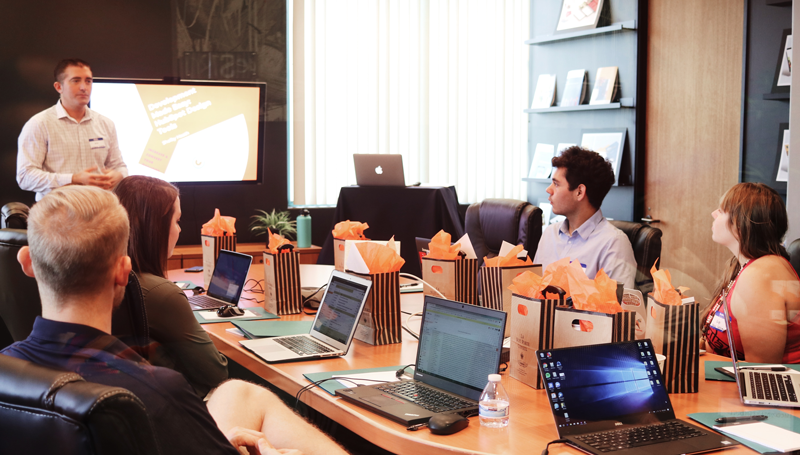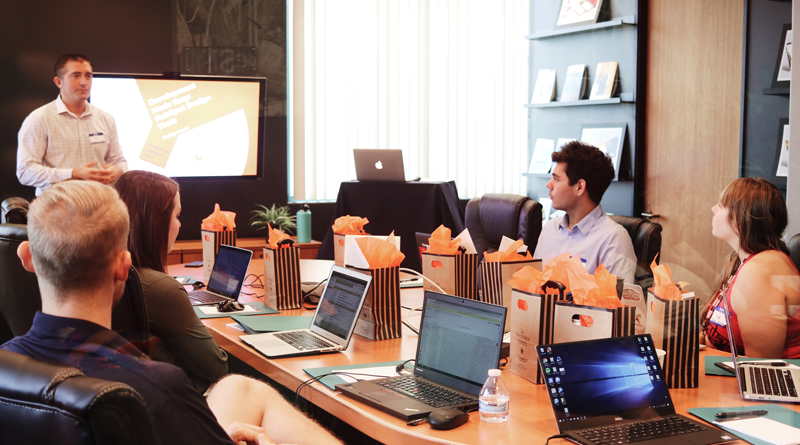LEADERS EXCHANGING IDEAS MAKES THE DIFFERENCE

How did your manager do during the coronavirus crisis? If your job moved to the living room, the relationships with your colleagues changed a lot during that period. A European survey conducted before the summer showed that empathic leaders were appreciated by their team members even more than before. Apparently, the work organisation also benefits from such an approach. We asked Cédric Velghe, co-founder of The Vigor Unit, a Ghent University spin-off that formulates scientific advice on personnel policy and labour organisation, for some more information.
We discovered that leading a team remotely comes with specific challenges. If you led a team from a distance, what would you focus on?
Cédric: “Maybe I would also be tempted to work in a more task-oriented way: make sure that everyone knows what must be done, how and by when, and then continuously try to monitor whether these tasks are actually carried out. Does everyone work enough and is the task completed? A lot of research has been done into the impact of that monitoring on the end result. The many hours of telework or working in virtual teams – when a group of colleagues works together full-time or part-time from a distance or at different moments – create a gap. In that context, task-oriented leadership is definitely required, but it turned out that most of all, the relation-oriented approach is what makes the difference. Colleagues feel isolated, they communicate less and they share less information and knowledge. Employees have to wait longer for feedback or a decision they need to continue with their jobs. That is what the role of the leader is: how to proactively close that unavoidable gap together? This is possible by encouraging the relational aspect between colleagues and by making time for moments of reflection, for example at the end of the day or after an important project. What went well, what can we do better? We have to share knowledge and concerns, think together about how to organise ourselves in the best possible way in this new situation. You, as a leader, do not need to have all the answers, but you can facilitate the conversation and reflection.”
“If we don’t strike the right balance between distance and closeness, our productivity, creativity and well-being will suffer eventually.”
“In addition, I would pay sufficient attention to the technological aspect. Mastering Zoom, Teams and the other commonly used applications: some of us manage without difficulty while others need some more assistance. As a leader, you have to know how these tools work, but also understand whether they are useful or not. You should be at the forefront and lead by example.”
Do you believe that the leadership attitude can really be influenced by the organisation, or does that quality mainly depend on the personality and sensitivity of the individual manager?
Cédric: “Can leadership be developed at an organisational level? The answer to this question is definitely yes. Research shows very clearly that training programmes and coaching can make a significant difference in leadership skills. Of course, the type of training is very important. It depends on a number of success factors, and starts with a thorough analysis of the actual need. What are the difficulties that the managers in this organisation encounter? What programme gives them the right basis? In any case, training soft skills has better results than deepening your insight into project or budget management. One of the most important conditions for a successful training is providing enough space to actually practise the desired behaviour. That can be achieved through role plays, sharing experiences and discussing your own situations. Managers must get a lot of opportunities to actually prepare or rehearse these conversations. That is also relevant in these complex times: one team member wants to return to the office as often as possible, while the other wants to stay at home. The optimal balance can only be achieved by organising a discussion about this topic, tailored to the needs of the department. Ideally, the organisation develops a clear framework, including some minimum goals, but most of all which describes how to start a dialogue about this. This way, each team can find the right balance between individualisation and alignment. For leaders, being able to exchange ideas about that type of consultation with other leaders is invaluable.
What trends in the “new normal” worry you?
Cédric: “If we don’t strike the right balance between distance and closeness, our productivity, creativity and well-being will suffer eventually. It is very important that we consider this sufficiently and that we talk about it with all the people involved. In addition, organisations could tend to be even more careful in response to the crisis and make additional savings, sometimes out of necessity. I hope that boards are aware of the long-term impact on motivation and involvement that such cost-cutting operations entail. The psychological contract with employees will be almost irreparably damaged by them, and this damage will last much longer than the management sometimes thinks. Research shows that involvement and happiness stabilise more slowly than is usually thought, as the employees’ perception of the employer has been affected. If restructuring cannot be avoided, the additional damage can be partly buffered if the employer invests enough in the people who stay. Offering additional training, investing more in participation: research shows that it can make a difference in the group’s involvement.”
Never Work Alone 2021 | Author: Lieveke Norga | Image: Pexels

